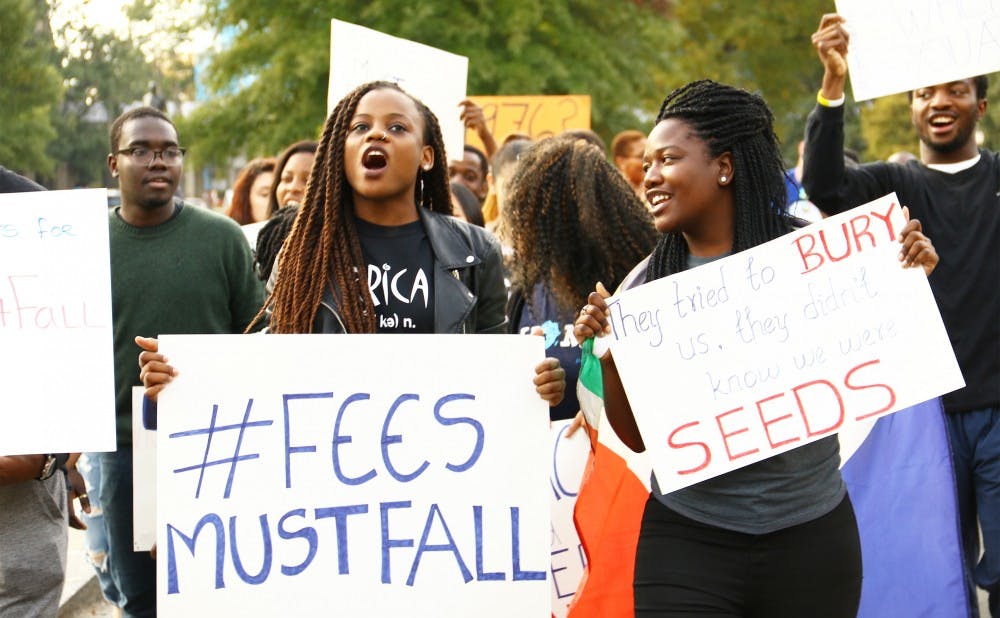A group of about 30 students gathered Sunday evening on West Campus to protest unfair tuition hikes and oppression in South Africa—with some drawing similarities to problems in the United States.
The protesters expressed their solidarity with the Fees Must Fall movement, which began when members of the Student Representative Council at the University of the Witwatersrand in South Africa shut down the university after administrators announced a 10.5 percent tuition hike. In response to nationwide protests and police violence, South African president Jacob Zuma announced last week that there will be no tuition hikes for the upcoming year. On Sunday, Duke students expressed their support for the South African students and argued that despite Zuma’s announcement, much work still needs to be done.
“People who were in debt last week are still in debt this week—it doesn’t challenge the issue at hand, that people are being financially excluded and unable to get an education,” said senior Busi Sibeko, one of the event’s organizers.
Students gathered on the steps of the Duke Chapel at 5 p.m. before marching around West Campus to chants of “fees must fall” and “Amandla Awethu,” a South African saying meaning “power to the people.” The march ended at the Bryan Center, where students spoke in more detail about issues in South Africa and explained why more students should get involved.
Senior Nash Mepukori, vice president of the Africa Conversations Club, noted that the Fees Must Fall movement addresses not only the cost of a university education in South Africa, but also points to a history of racial and class oppression.
“South Africa needs to find not a short-term solution, but a long-term solution to the education of its most vulnerable,” she said.
Sibeko explained that she had the idea for a protest on Duke’s campus after hearing about solidarity marches in London and New York and desired to help form a chain of protests.
One of the goals for the march was to educate students on campus about events in South Africa, she said. She noted that if people do not realize that South Africans are fighting for a right to education, they cannot help them.
Students also spoke of the importance of showing solidarity with those in South Africa.
“That’s what we’re here to do today—to echo their voices, to show someone’s listening,” senior Dimeji Abidoye said. “If nothing else, they’ll get a few angry posts on Yik Yak. Someone will Google it, and they’ll see there’s a movement happening here.”
Some students drew parallels between the movement in South Africa and issues regarding increasing tuition and discrimination in the United States.
“As student debt looms and tuition continues to increase at universities across this country, including our own, perhaps we can take a page from their book and encourage our leaders to make college affordable for all students,” said sophomore Chandler Phillips, secretary for the Duke Chapter of the National Association for the Advancement of Colored People.
Several students also noted their personal connections to the struggles South Africans are facing.
“My friends were arrested, got bailed out after a lot of support. Some friends were in the hospital. This is very real to me, dear to me,” said junior Uzoma Bailey Ayogu, who spoke at the event.
Chris Burner, a second-year graduate student in the Divinity School who worked at a church in Cape Town this summer, noted that the movement is important because it highlights institutionalized racism and systematic oppression.
Sibeko challenged Duke students who participate in international programs to pay attention to the issues of inequality and discrimination found in countries around the world, including South Africa.
“Duke students want to do DukeImmerse in South Africa, DukeEngage in South Africa, study abroad in South Africa, but they don’t want to recognize structural injustice in South Africa or participate in eradicating it,” she said.
Get The Chronicle straight to your inbox
Signup for our weekly newsletter. Cancel at any time.

